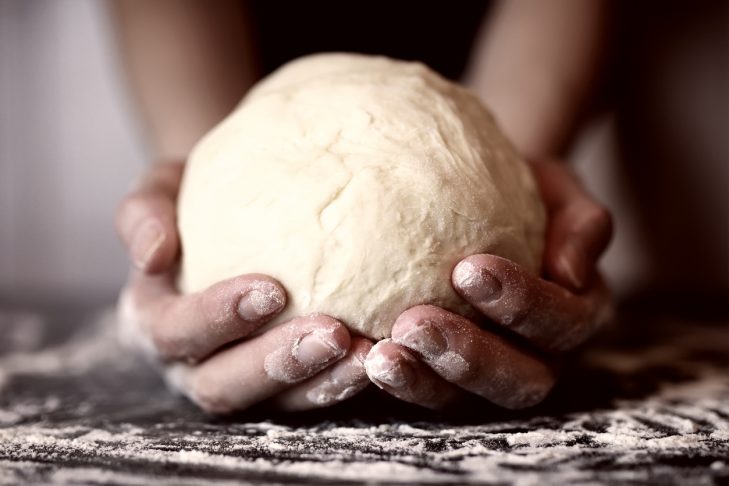With Passover and its restrictions on leavened foods approaching, I’ve been thinking a lot about bread. Bread, at its core, is synonymous with life, basic sustenance and community. In Hassidic and Orthodox culture, bread shepherds a new life into the home and acts as provisions for the dead as they leave. On Shabbat, challah rests luxuriously under a napkin or decorated cover, braided and lovely. I remember bagels loaded with cream cheese, Hawaiian King rolls accompanying special dinners, even the place of honor a Home Pride loaf took in the baby seat of my mother’s shopping cart.
Many of my favorite Jewish experiences also revolved around bread. As a kid on Shabbat, I looked forward to saying HaMotzi, passing the enormous loaves around and licking honey from my fingers. At Kent State’s Hillel, the blessing was a table affair, with spare loaves pinched from empty tables by whoever was quickest. Sticky loaves sharing hands, the bread knives ignored on their white plates. Challah was about more than community; it was about family.
In Jewish culture, bread and wine have similar significance. Both are cultivated from raw ingredients gifted to the Jewish people by God. We could simply eat wheat and grapes, but through our intelligence and free will, we are able to enhance them. We imbue God’s creations with our own life, which I believe is quintessential to the Jewish experience. We do not merely take what God gifts us; we alter it, we argue over it, we enchant it in deeply human ways. Something as simple as letting dough rise becomes a religious act, a respect for God’s creation while still interacting with it in new ways.
A couple of times during my adult life, I considered baking challah myself. There was something so intimate about challah: its connection to my more religious childhood, the effort and care that went into preparing it, its inherent need to be shared. But I’d never made bread before and had the perception that it was difficult and time consuming. I was afraid of potential failure and so I avoided baking entirely.
Then, of course, I met my girlfriend. Before her, I balked at the idea of domesticity. Not only was my hypothetical partner not Jewish, he barely existed even in my fantasies of the future. Building a home with someone always involved a faceless, nameless man who drifted in and out of the rooms of my house like a ghost. I could leave a seat open for Elijah, but there was no point in baking an entire loaf of bread for me and this apparition.
Olivia bakes all of her own bread. Her first two loaves were a slender loaf of French bread and traditional challah delicately braided from three equal ropes of dough. Her mother kept a sourdough starter named Chet in the fridge and promised Olivia his progeny once she moved out. I watched her scrape dough onto her mottled countertop, kneading it with the heels of her hands. Suddenly, baking seemed simple, my future looking at me over a bowl of egg wash.
“Your girlfriend bakes bread?” The question feels loaded, laced with disbelief not at the physical strength and patience needed, but at the roles Olivia and I are supposed to fill. In traditional Judaism, baking bread is the woman’s responsibility, but breadwinning falls to the man. How was our relationship supposed to work if we were both in the kitchen, jostling each other with our elbows, territorial in our space? This leads to further compartmentalization, separating us into masculine or feminine gender roles based on our external appearances. Of course, there is no man in a lesbian relationship. Heterosexual gender roles have no basis and both partners can fulfill the needs of the household as they arise. Much like turning God’s wheat into flour and flour into bread, people take nebulous concepts of home and need and relationship and turn them into something hearty and sustainable.
My incorporeal future husband is not someone I can sit at the table with. His mother will not gift me Son of Chet. He will not perfect a six-strand braid and pull a shining loaf from the oven with sparkling eyes. Olivia will. Love rises even as the future trudges forward, baking matzah on its back.



